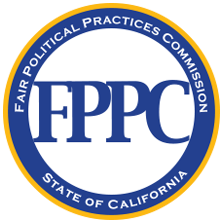July 22, 2022 •
California to Allow Crypto Contributions

Flag of California
The Fair Political Practices Commission (FPPC) of California voted to allow contributions to political candidates in cryptocurrency. Until now, contributions made in cryptocurrency were banned under all circumstances. Under the new regulation, the contribution must immediately be converted into dollars […]
The Fair Political Practices Commission (FPPC) of California voted to allow contributions to political candidates in cryptocurrency.
Until now, contributions made in cryptocurrency were banned under all circumstances.
Under the new regulation, the contribution must immediately be converted into dollars upon making the contribution and the cryptocurrency must be processed through an exchange registered with the U.S. Department of Treasury, Financial Crimes Enforcement Network.
An exchange is the marketplace where cryptocurrency is converted to different types of tender, including USD and the exchange can charge transaction fees.
The limits on cryptocurrency are the same as any non-cash contribution.
When reporting cryptocurrency contributions, the amount of the contribution is the fair market value of the cryptocurrency at the time the exchange obtains possession of the contribution and any amounts charged or withheld by the exchange must be reported by the committee as expenditures at the time the fees are deducted or charged.
February 18, 2022 •
Iowa Ethics and Campaign Disclosure Board Classifies Cryptocurrency as In-Kind Contribution

Btc Bitcoin - Image by A M Hasan Nasim
The Iowa Ethics and Campaign Disclosure Board voted unanimously to issue an advisory opinion classifying political donations in cryptocurrencies like Bitcoin and Ethereum as in-kind contributions. Candidates may accept payments but must report the cash value and the donor’s name, […]
The Iowa Ethics and Campaign Disclosure Board voted unanimously to issue an advisory opinion classifying political donations in cryptocurrencies like Bitcoin and Ethereum as in-kind contributions.
Candidates may accept payments but must report the cash value and the donor’s name, and they must report when a cryptocurrency is sold and to whom.
The opinion notes campaigns cannot spend cryptocurrency directly because all campaign expenditures must come from money deposited into an Iowa financial institution.
January 29, 2021 •
Ethic Commission Disallow Cryptocurrency Contributions

South Carolina Capitol Building
The South Carolina Ethics Commission issued an opinion finding candidates for public office may not accept campaign contributions in the form of digital cryptocurrencies, including Bitcoin. Advisory Opinion 2021-001 references and adopts the reasoning of a similar opinion issued in […]
The South Carolina Ethics Commission issued an opinion finding candidates for public office may not accept campaign contributions in the form of digital cryptocurrencies, including Bitcoin.
Advisory Opinion 2021-001 references and adopts the reasoning of a similar opinion issued in 2018 by the South Carolina House Ethics Committee.
The opinions found cryptocurrencies do not meet the definitions of a “thing of value” or “contribution” as defined under current state law.
Both opinions state the decision to permit such contributions should be done through an act of the Legislature rather than through an advisory opinion.
May 20, 2019 •
Minnesota Bill Addresses Digital Political Contributions

Minnesota House Chamber - Chris Gaukel [CC BY-SA 2.0 (https://creativecommons.org/licenses/by-sa/2.0)]
On May 14, a bill was introduced in the Minnesota House of Representatives to prohibit political candidates from accepting certain digital currency like bitcoin unless backed by an official legal currency. House File 2884 would prohibit an individual, political committee, […]
On May 14, a bill was introduced in the Minnesota House of Representatives to prohibit political candidates from accepting certain digital currency like bitcoin unless backed by an official legal currency.
House File 2884 would prohibit an individual, political committee, political fund, principal campaign committee, or party unit from soliciting or accepting a contribution or donation of any digital unit of exchange.
This includes but is not limited to bitcoin, that is not backed by a government-issued legal tender.
Under the bill, a person knowingly accepting any prohibited digital unit of exchange would be guilty of a felony.
The legislation also imposes a civil penalty of up to $3,000 for any individual, political committee, political fund, principal campaign committee, or party unit knowingly soliciting or accepting any digital unit of exchange.
December 12, 2018 •
FEC to Consider Whether Mining Cryptocurrencies Is Contribution
On December 13, the Federal Election Commission (FEC) may consider whether allowing an individual volunteering to allow the processing power of his or her internet-enabled device to mine cryptocurrencies for the benefit a political committee would be considered a political […]
 On December 13, the Federal Election Commission (FEC) may consider whether allowing an individual volunteering to allow the processing power of his or her internet-enabled device to mine cryptocurrencies for the benefit a political committee would be considered a political contribution.
On December 13, the Federal Election Commission (FEC) may consider whether allowing an individual volunteering to allow the processing power of his or her internet-enabled device to mine cryptocurrencies for the benefit a political committee would be considered a political contribution.
An advisory opinion request asks the FEC if a federal political committee could allow its individual supporters to volunteer the processing power of their internet-enabled devices to pool the processing power of these devices, which results in the mining of a “block.”
Mining allows transactions between users to be authenticated and generates a new cryptocurrency unit for the miner as a reward for creating the “block” and pays the miner a transaction fee. Creating blocks requires enormous amounts of computing power and can take years to generate a valid “block” by a single miner.
The FEC may consider Draft Advisory Opinion 2018-13 (Draft A) at its open meeting December 13, or hold it over for a future date.
September 24, 2018 •
California Bans Cryptocurrency Campaign Contributions
On September 20, the Fair Political Practices Commission prohibited the use of cryptocurrency in political contributions in California. The FPPC stated the anonymity of these donations would make it difficult to discern who is attempting to influence elections. This is […]
 On September 20, the Fair Political Practices Commission prohibited the use of cryptocurrency in political contributions in California.
On September 20, the Fair Political Practices Commission prohibited the use of cryptocurrency in political contributions in California.
The FPPC stated the anonymity of these donations would make it difficult to discern who is attempting to influence elections.
This is contrary to the position the Federal Election Commission took in 2014, which said cryptocurrencies are in-kind property and federal candidates could accept them as a form of contribution under certain conditions.
August 10, 2018 •
California FPPC to Consider Use of Cryptocurrency for Campaign Purposes
The Fair Political Practices Commission is considering changes to state campaign finance regulations. The commission was asked to consider the permissible use of cryptocurrency, such as Bitcoin, for campaign contributions and expenditures. Though similar to cash, such currency is not […]
 The Fair Political Practices Commission is considering changes to state campaign finance regulations.
The Fair Political Practices Commission is considering changes to state campaign finance regulations.
The commission was asked to consider the permissible use of cryptocurrency, such as Bitcoin, for campaign contributions and expenditures. Though similar to cash, such currency is not issued by a governmental entity.
Issues expected to be discussed at a public hearing include banning the use of cryptocurrency for campaign purposes, limiting cryptocurrency contributions to the amount of contributions received in cash, requiring cryptocurrency contributions to be converted to cash, permitting committees to establish separate cryptocurrency accounts, or permitting cryptocurrency contributions as in-kind contributions without regard to cash limits.
A public hearing will be held September 20, 2018; written comments should be received by September 18.
Colorado Secretary of State Wayne Williams is considering amendments to the state’s campaign finance rules. A new rule would allow committees to accept contributions in the form of cryptocurrency up to the limits for cash or coin contributions. The value […]
 Colorado Secretary of State Wayne Williams is considering amendments to the state’s campaign finance rules.
Colorado Secretary of State Wayne Williams is considering amendments to the state’s campaign finance rules.
A new rule would allow committees to accept contributions in the form of cryptocurrency up to the limits for cash or coin contributions.
The value of such contributions would be the value of the cryptocurrency at the time the contributions are made.
Prior to issuing the proposed draft, the Secretary of State’s office is seeking public comments to identify potential revisions and additional guidance. Comments must be submitted by May 23.
State and Federal Communications, Inc. provides research and consulting services for government relations professionals on lobbying laws, procurement lobbying laws, political contribution laws in the United States and Canada. Learn more by visiting stateandfed.com.

